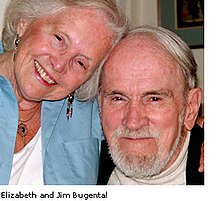James Bugental
Appearance
(Redirected from Bugental, James)
This article needs additional citations for verification. (March 2008) |
James Bugental | |
|---|---|
 | |
| Born | James Frederick Thomas Bugental December 25, 1915 |
| Died | September 17, 2008 (aged 92) |
| Era | 20th century |
| Region | Existential-Humanistic Psychology |
| School | Existential-humanistic therapy |
Notable ideas | Postulates of humanistic psychology |

James Frederick Thomas Bugental[1] (December 25, 1915 – September 17, 2008) was one of the predominant theorists and advocates of the Existential-humanistic therapy movement. He was a therapist, teacher and writer for over 50 years. He received his Ph.D. from Ohio State University, was named a Fellow of the American Psychological Association in 1955, and was the first recipient of the APA's Division of Humanistic Psychology's Rollo May Award. He held leadership positions in a number of professional organizations, including president of the California State Psychological Association.
Theory
[edit]In "The Search for Authenticity" (1965), Bugental summarized the postulates of humanistic psychology, often quoted by other theorists:
- Human beings cannot be reduced to components.
- Human beings have in them a uniquely human context.
- Human consciousness includes an awareness of oneself in the context of other people.
- Human beings have choices and responsibilities.
- Human beings are intentional, they seek meaning, value and creativity.
Publications
[edit]- "The Search for Authenticity" (1965)
- "The Search for Existential Identity" (1976)
- "Psychotherapy and Process" (1978)
- "Intimate Journeys: Stories from Life-Changing Therapy" (1990)
- "The Art of the Psychotherapist" (1992)
- "Psychotherapy Isn't What You Think" (1999)
References
[edit]- ^ Stefan E. Schulenberg, Approaching Terra Incognita with James F. T. Bugental: An Interview and an Overview of Existential-Humanistic Psychotherapy. Journal of Contemporary Psychotherapy (2003), 33, 4, pp. 273-285.
